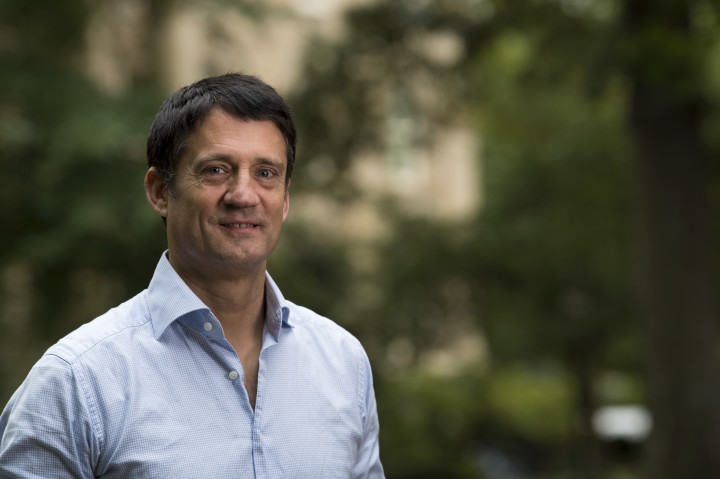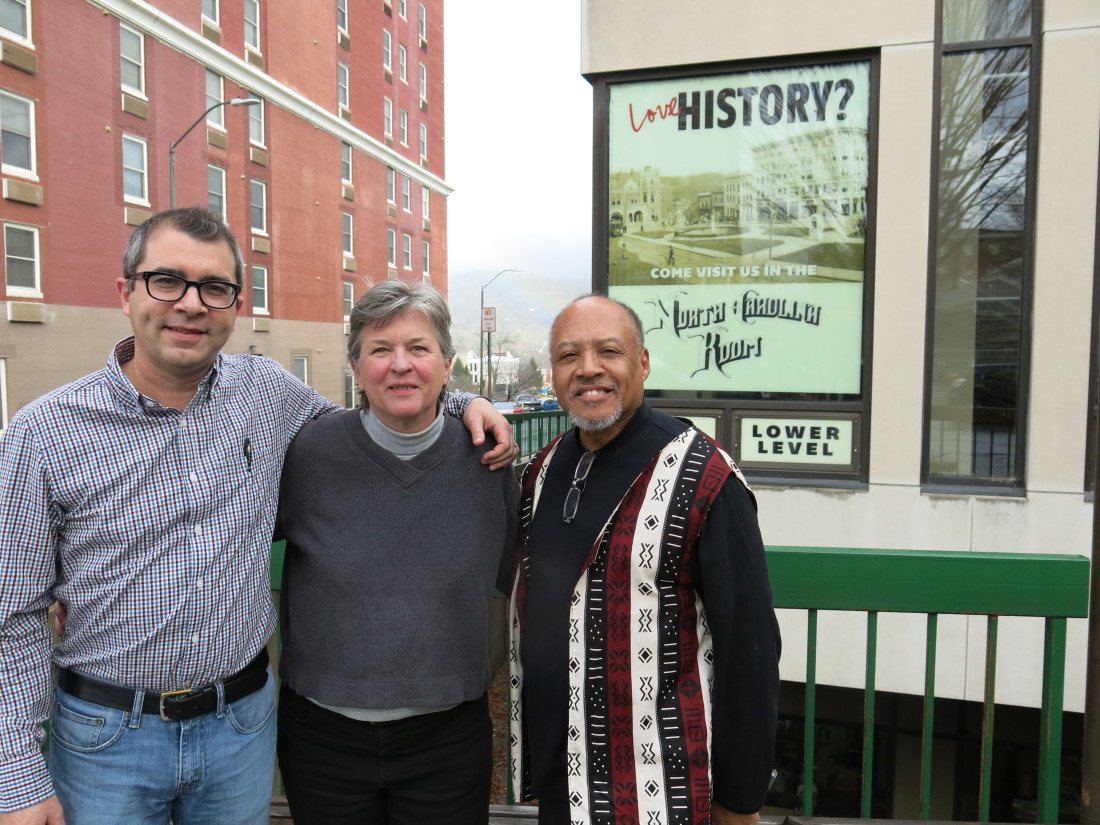Controversial topics do not faze historian Fitzhugh Brundage. It’s quite the contrary, says the author and UNC Chapel Hill department chair: “I’m happy in engaging people who don’t agree with me.”
On Saturday, Feb. 3, Brundage will participate in “Monumental Decisions: The Legacy and Future of Civil War Markers in Our Public Spaces,” a free community forum. The event takes place in the Lord Auditorium at Pack Memorial Library. It will also feature presentations by Roy Harris and Jon Elliston, members of the Friends of the North Carolina Room.
Both Harris and Elliston will focus on local history. Harris will offer a brief overview of the seven Confederate monuments located in Buncombe County. Meanwhile, Elliston will present on key civic and community leaders who supported the construction of these monuments. Many of these proponents, says Elliston, “were also avid supporters of our local white supremacy movement, which was jarringly strong.” (See “Asheville Archives: ‘White supremacy made permanent,’ 1900,” Jan. 31, Xpress)
Brundage’s presentation, titled “A Vexing and Awkward Debate: The Legacy of a Confederate Landscape?” will take a broader look of the state’s overall historical embrace of Confederate monuments. According to Brundage, these memorials and the rhetoric surrounding their placement in towns and cities throughout North Carolina provide insight into the social and political movements that arose following the conclusion of the Civil War.
Through this lens, Brundage will also address what these statues and ceremonies mean in terms of the region’s collective memory at the time of their installation. “There was a white Confederate version of history that was on the landscape and then there was an alternative African-American memory that was less conspicuous,” he says.

Brundage hopes the talk encourages people to reflect on the meaning of an area’s public space and the narrative it conveys. On a larger scale, this goal is reflected in Brundage’s role as scholarly adviser to “Commemorative Landscapes of North Carolina,” a digital publishing program at UNC Chapel Hill. As its title suggests, the ongoing project seeks to document the state’s history through its commemorative monuments, shrines and public art.
Brundage says questions concerning the selection process of these statues must be asked. Why, for example, do Confederate memorials reign supreme across North Carolina, while remembrance of the state’s Union soldiers go neglected in most public spaces? What message does that send? “I think that it is very important to have that discussion, because it opens up the possibility for making informed choices,” Brundage explains.
Hidden past in plain sight
Zoe Rhine, the forum’s co-organizer and North Carolina Room staff member, says her own unfamiliarity with the state’s and region’s complex history surrounding these monuments was what inspired her to help create the upcoming event. “As the discussions came up about Asheville’s Confederate monuments, I realized that, first of all, I’d never thought about them very much,” she says.
With 23 years of experience working in the North Carolina Room, Rhine says, she had believed her grasp of local history was sound. “But I realized that I knew very little about the social and political environments of the county and of North Carolina in the late 1800s and early 1900s,” she concedes.
When it comes to Confederate monuments, one of the greatest obstacles preventing thoughtful dialogue is the hardline stance many individuals and groups bring to the table. “In some ways this is a zero-sum debate,” Brundage says.
Harris agrees. As a member of Mount Zion Missionary Baptist Church, Harris recalls a recent listening forum his church held on the matter. “We did find that a lot of people who have strong feelings both ways on the topic really didn’t want to talk about it,” he says.
Still, all members involved in the upcoming talk at Pack Memorial Library believe events like “Monumental Decisions” create the potential for a greater understanding. “It’s very important to know the role of race in local and state politics at the turn of the century,” says Rhine. “A monument is dedicated by someone’s version of history. … The monuments did not reflect everyone’s vision of history and often left out a lot of history. I think it is very appropriate for Asheville and Buncombe County’s local history room to make this information available to the public, who is now trying to grapple with Confederate monuments today.”
For Elliston, contributing to a more informed public through civil discourse is among his top priorities. “I think it’s crucial that we keep the dialogue going now,” he says. “In some ways, we’re having the dialogue for the first time in decades. A lot of people are bringing a whole lot of new thoughts and perspective to the table, and I’d much rather see us have a civic dialogue about it than the kind of violence and recrimination that happened in Charlottesville.”
WHAT: “Monumental Decisions: The Legacy and Future of Civil War Markers in Our Public Spaces”
WHERE: Lord Auditorium at Pack Memorial Library, 67 Haywood St. avl.mx/4ji
WHEN: Saturday, Feb. 3 at 2 p.m. Free




What could go wrong?
See below.
This sounds like a good talk. It’s taken the controversy over removing / recontextualizing monuments to bring back into focus the periods when they went up and the underlying civic / political intent of doing so, as opposed to the periods and people actually being memorialized, and the ways that after-the-fact definition of public space becomes a legacy.
By way of civil discourse, here’s a preview: https://www.vox.com/the-big-idea/2017/8/18/16165160/confederate-monuments-history-charlottesville-white-supremacy.
LOL instead of monuments they should focus on the rampant corruption in local government. When the citizen times writes they had to get a lawyer 3 times to motivate the county to disclose info, it ain’t inanimate objects but scumbag hacks that need to be removed.
And that has what to do with Confederate monuments?
There are more important things to deal with than monuments. Bunch of government goons coming out to remove them. The same corrupt goons need to be removed themselves.
So it’s just a general, “Please don’t talk about that”. Got it. Thanks.
I hope this panel doesn’t shy away from the central issue. This report came out yesterday:
U.S. education on American slavery sorely lacking
https://www.splcenter.org/news/2018/01/31/splc-report-us-education-american-slavery-sorely-lacking
Now that’s just the kind of hardline stance that creates the greatest obstacle to thoughtful dialogue. It wasn’t slavery. It was ante emancipationism, ah say it was ante emancipationism, suh.
Easy with the Foghorn Leghorn, buster. Our own Rep. Felix Walker (“Ah say ah say ah’m speaking for Buncombe, Suh!!”) predicted that the Missouri Compromise would lead to the Civil War, wa-a-a-ay back in 1820. Unfortunately, he was such a blowhard his colleagues wouldn’t let him finish, and he had to get it printed in the paper.
https://en.wikisource.org/wiki/Missouri_Question:_Speech_of_Mr._Walker,_of_N.C.
(Like I said, blowhard. Scroll down to the last few paragraphs.)
To quote Henry Ford, history is politely debatable.
To quote Konrad Adenauer, history is the sum total of things that could have been avoided.
Not sure if you’re being serious here, Barry, but if you’re suggesting that popular sovereignty — which, to the extent I can tell, is what our native son was trying to advocate in his delightfully Trumpesque speech — would have prevented the Civil War, check out how well it worked in Kansas.
I can’t believe we still have libraries.
Are they inviting the most Reverend William Barber to participate and lead democrackkk prayer ?
Where is Thomas Calder’s excellent essay, ” ‘White supremacy made permanent’: Asheville rallies around voting restrictions, 1900″ ?
It is nowhere here within the Mountain Xpress website for the Jan. 31 to Feb. 6, 2018, issue !
Also, why is it so difficult to login to offer a comment ?
The link to Facebook, for instance, is not even functioning !
Weird.
And yet, today, I once again had problems linking up with Facebook.
:-(
It will post on Tuesday.
I see it. Thanks, Able Allen — a hard-working office manager and reporter at MOUNTAIN XPRESS!
:-)